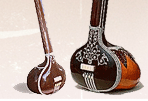





|
|



"The Importance of Taalim"
I was a sportsman in my school and college days, a basketball and volleyball player. But music, especially the flute has always been my first love. In fact no one actually ever initiated me into playing it. I picked it up on my own. My father Niranjan, a disciple of Pannalal Ghosh, the legendary flutist, had the habit of hanging his flutes on the front room walls of our house. When I was around seven, one day I jumped up to pluck the instrument and started blowing it. There was not a single besur (out of tune) note in what I was playing. My grandfather who overheard me from the adjoining room, was surprised by my ability.
When my father heard me he took me to his guru and requested him to listen to me playing. Pandit Pannalal Ghosh was so impressed by my playing that he presented me with one of his own flutes which, even today, I treasure very much. From then on I was labeled as a child prodigy. Though not a disciple of Panditji, whenever I accompanied my father to his house, I was given tips to play the flute.
For many years I copied Panditji blindly. I used to by-heart his records and repeat it on my flute. I never though of innovation or to change my style to suit myself. I was not original. Whatever I played, it would come as an imitation of what I heard. I was considered at best to be a great imitator - at a time when it was thought to be a great achievement to play like the great master.
This was till Guruma Annapurna Devi, daughter of the music doyen Ustad Allaudin Khan, the founder of Maihar gharana, took me under her wings. Allaudin Khansaheb was a maestro par excellence and had the ability to play on almost any musical instrument. No doubt many of his disciples became famous in the music world.... Pandit Ravi Shankar, Ustad Ali Akbar Khan, Pandit Pannalal Ghosh and Annapurna Devi to name a few. Marriage to Pandit Ravi Shankar robbed Annapurna Devi the credit and fame which was her due. She shuns publicity and is very choosy about whom she teaches music. In fact, when she was awarded the Padma Bushan, she had sent one of her friends to receive it. After Guruma accepted me as her shishya (student), I realized what I had been doing till then. She told me,"There can be many who can play like Pannalal or Chaurasia, but why do you want to belong to that herd? You should evolve your own style, a Nityanand style of flute-playing."
This was the first time that anyone had given me such an advice. Before this I was taught different ragas and the various intricacies involved in flute playing. Somewhere in my youth I lost the charisma and the promise of becoming a great flutist, which I had when I was a teenager. In school and college I got more interested in games. And after graduation, I wanted to succeed in life, so I became a businessman, manufacturing medical appliances. In retrospect I regret what I had done then - neglect the bansuri. After an accident during those days I developed partial facial paralysis too. This greatly affected my capacity to blow on the flute. My woes did not end there. Immediately after, I fractured my right hand in an accident which restricted the nimbleness of my finger movements on the holes of the flute.
Then one day, feeling very low, I remembered my forgotten flute. I somehow felt that the flute would revive my spirits and bring back my life to me. My face was still paralyzed. I took the flute and started blowing in it. It was really tough. I was undergoing homeopathy and ayurvedic treatment to cure my paralysis.
To top it all, as a businessman, I had acquired a vice - I had become a chain-smoker which really played havoc with my ability to blow on the flute.
But I had friends and well wishers like Kishori Amonkar who brought me back to my first love - flute playing. She told me,"There will be many successful businessmen and you may become one of them. But think how few successful flute artists there are. And if you become one of them, how proud you will feel."
That was a turning point in my life. I decided to devote the rest of my life to become a flutist. Pandit Devendra Murdeshwar, a senior disciple of Pandit Pannalal Ghosh agreed to hone my talents and for several years I was under his tutelage. Only after receiving his consent did I seek Guruma's blessings. The right taalim (training) makes a lot of difference. You may be a good athlete but that doesn't mean you can win in the Olympics. Even in music, like athletics, you have to have professional training to be good - to be an achiever.
There is so much talk of guru-shishya parampara . The present day musicians are so busy performing in the concerts, whether here or abroad that they hardly have time to devote to their disciples. It is a loss of music for the new generation.
The awareness of our classical tradition is growing. In metro cities hundreds turn up for the concerts but they are not very serious listeners compared to the audiences that turn up in small towns. Recently I played in Hubli. It was an appreciative audience which was moved by my performance of Rag Des. I played the older style which is not very popular among our musicians and obviously our listeners too. But my rendering brought tears to the eyes of the listeners. That's when I felt traditional taalim does really make its impact. Commercialism of music may have led to its wide popularization, but what the listeners are receiving from the community of musicians now isn't authentic. Musicians and their music have been affected by playing to the gallery. What's popular is not necessarily authentic, real. This ultimately has led to the frittering away of tradition which has been preserved and continued by our great masters.
My taalim has taught me not to pander to the gallery. When I play I close my eyes as if in prayer and remind myself that I am paying obeisance to God. If the audience is not impressed with my performance, the fault lies with me. It's my lack of homework. It is heartening to see so many artistes coming in the market. The recording companies too are giving an opportunity to new and upcoming musicians. One thing I have observed is that personality plays a dominant role in one's success. A pleasant personality, pleasing manners prove a touchstone in the world.
As told to Hiren K Bose
[Back]
HOME | REVIEWS | CDs| INTERVIEWS | DISCOGRAPHY | BANSURI | CONTACT ME